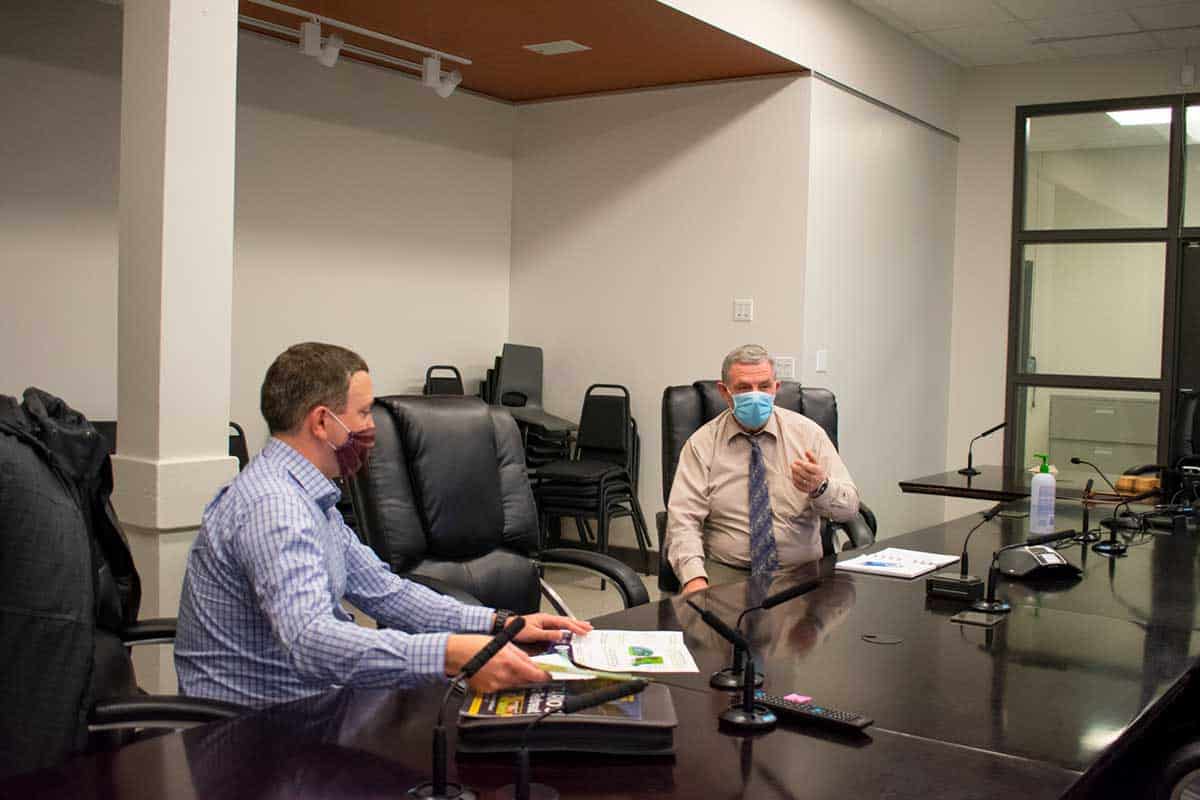MANITOULIN – reThink Green concluded energy and emissions projects on Manitoulin Island and the North Shore with the release of Regional Energy and Emissions Plans (REEP) for both regions. The project began in 2017 and included meetings, presentations, data collection and educational events that explored the potential for regional energy and emissions planning across 25 participating communities. The project looked at the potential impacts of climate change on Manitoulin and the North Shore, with a focus on regional collaboration on climate action.
While the REEPs are not official documents, they could provide a foundation for a regional approach to climate change mitigation going forward.
“The REEPs provide best practices of how each region can adapt if they wish to,” said Simon Blakeley, program director for reThink Green in a virtual launch held January 25. “In particular, we’ve provided a range of low carbon development projects and solutions including examples of policies, plans, proposals and actions that can be used by even the smallest municipality, township or First Nation.”
Funding for rethink Green’s Smart Green Communities project was provided by the Canadian Federation of Municipalities (FCM), the Independent Electricity Systems Operator (IESO) and the Environmental Defense Fund. Participation in the project was voluntary and all services were offered free of charge. Data was gathered through community consultations and/or through publicly available sources.
“It is hard to see carbon emissions and predicted impact with the naked eye,” said Angela Jiang, a program officer with Smart Green Communities. “It is not black or white and it certainly is interconnected with various factors. The impact of emissions from any given source will have an effect on the environment all around us. Some of the effects are included in the REEP which discusses ‘business as usual’ scenarios.”
In this case, business as usual is a projection of future climate scenarios associated with growth as if no action was taken or policies implemented to address emissions, said Ms. Jiang. “Manitoulin Island and the North Shore regions have already seen flooding events, forest fires, ice storms that have shut down roads and interrupted critical services and affected the health and safety of the residents. Brownouts resulting in the disruption of energy distribution transmission and supply systems are becoming increasingly common and energy blackouts remain a very distinct possibility.”

The REEP projects that these weather events, caused by high or low precipitation periods, variable temperature changes within seasons and unpredictable weather patterns, will occur more frequently but with larger, more devasting consequences if a business as usual approach continues, she said.
“We can all work together on addressing the effects of climate change by adapting and mitigating the risks,” she said. Smart Green Communities wants to continue to work with participating communities to help them achieve their emissions goals and to create a more sustainable environment.
“The real elephant in the room is climate change itself and the many obstructions and uncertainties which climate change-related events can bring to our daily lives,” Mr. Blakeley said. “It seems we have a choice: the question is will we see this moment and see it as a turning point or will we continue until it reaches a tipping point?”
“Some of you may be wondering what happens next,” he added. “Since early last year the COVID pandemic has taken precedence in all of our live and we still have a long way to go before any sense of normality resumes. As different movements around the world have shown, a large body of people, if not the majority, have indicated they are not interested in going back to a business as usual approach; not least of which is actions that are known to adversely impact the very people, community and environments we all depend on. Building from what is now a deep-rooted movement, policy makers, influencers, industrialists and others of all political persuasions are now speaking out about the impending climate crisis. With fears of global economic recession a very distinct possibility, governments, businesses, not-for-profits, communities, individuals and households around the world are asking themselves, how can we build back better? Ultimately it seems we need to invest in a green economy based on a sustainable resilient and compatible with nature.”
On a global scale, the main marker of progress to date remains the Paris Agreement of 2015 in which the long term goal is to keep the average temperature increase to well below 2°C above pre-industrial levels and preferably to keep that increase below 1.5°C, Mr. Blakeley noted. “These recommendations were informed by an International Panel on Climate Change report published in 2018 which said global emissions and atmospheric carbon must peak by 2020. A further meeting of global nations is supposed to take place in Glasgow in the UK in November 2021 at COP26. With a recent commitment by Joe Biden and the US administration to re-enter the Paris Agreement it is hoped that other countries around the world may follow suit and that stronger targets and actions can be established.”
The federal government published its updated climate plan in December 2020 entitled, ‘Healthy Environment, Healthy Economy: Canada’s strengthened climate plan to create jobs and support people, communities and the planet.’ “The climate plan is an ambitious target setting document which aligns with international commitments made within the Pan-Canadian Framework for Climate Change.” The climate plan identifies where and how funding streams, financial incentives and other rebates could be used by the government. In their initial meeting, Prime Minister Trudeau and President Biden affirmed that climate change is a shared priority.
Mr. Blakeley also spoke about how several major provincial projects currently under discussion could result in long term benefits for Northern Ontario if approached in a coordinated, sustainable and inclusive manner, which would also assist Ontario’s efforts to reduce greenhouse gas emissions. Specific projects include the proposed reinstatement of a passenger railway network to provide a more efficient and modern transportation alternative for individuals in Northern Ontario as well as advancement of the long debated Ring of Fire and other mining, resource and forestry-led projects could herald a new era for Northern Ontario businesses, designers and manufacturers. The development of new technologies and products will help reduce our dependency on fossil fuels and create more sustainable practices. In all cases, stakeholder engagement or public consultation will be needed.
On a local level, Mr. Blakeley praised the efforts of Craig and Kelly Timmermans, owners of CFRM Glow 100 and Country 103 and widely acclaimed for having developed Canada’s first green radio station. “This can operate entirely off the grid,” he said. “Located in Little Current, the two storey, 2,400 square foot studio office at 1 Radio Road is also the home of the Manitoulin Country Fest grounds which is equipped with 24 solar panels and four wind turbines.”
He also highlighted United Manitoulin Islands Transit (UMIT) and the greenhouse projects at Wikwemikong High School, “which was built and managed by students for hands-on learning of agricultural techniques and broader business practices. The greenhouse will also help the community become more food self-sufficient.”
Mr. Blakeley encouraged best practices that households and individuals can adopt to reduce their impact, including behavioural changes such as reducing electricity consumption during peak time demands, choosing locally sourced and manufactured products and also using technology to help avoid any unnecessary in person meetings. Another step would be to introduce energy efficient measures such as installing programmable thermostats, periodically replacing air filters in air conditioners and heaters, replacing incandescent lights with LEDs, properly sealing and insulating your homes and washing laundry in cold water where possible. You can also invest in electric vehicles, he suggested.
According to Mr. Blakeley, the necessary first steps for communities are climate change emergencies, producing inventories and calculating the greenhouse gas (GHG) emissions and relying upon this data to produce GHG emissions reduction targets, climate action plans and other guidance documents. “Some of the more advanced communities produce strategic operational plans to ensure all plans and policies are developed using a climate lens and they’re adopting systems and technology to reduce GHG emissions while introducing innovative approaches to land use management and building design standards. They’re also investing in renewable energy projects,” he said.
The REEP suggests much of this action is already underway but there is still plenty of work to do to develop solutions that build a more sustainable environment and economy.
Ultimately we will have to decide who we are as Canadians, Mr. Blakeley said. “Putting the politics aside, the REEPs do identify a more resilient and energy efficient grid will be necessary for us to withstand the predicted effects of climate change. There is no one-size-fits-all solution. All Canadians are unique in assets, issues challenges and opportunities. Sustainable development requires more of a smorgasbord approach. We can do this. Now is the time for us all to play our part as we strive towards a more sustainable future.”
Looking at climate locally, Mr. Blakeley reminds us we need to consider climate globally and says we all have a role to play. “Weather affects everything and we have a role to play in how it affects us.”
Following a presentation by Pratap Revuru, director of microgrid solutions and strategic partnerships with the global corporation, Schneider Electric, who spoke about Schneider’s approach to simple and accessible energy products and automated solutions for sustainability at a community level, Mr. Blakeley concluded by sharing reThink Green and Smart Green Communities’ hope that the REEPs spark interest and inspire communities to work together to take collective action on climate change. To read the full report, visit reThink Green’s Smart Green Communities website.





